Diploma in Psychology: General Socialization Academic Essay
VerifiedAdded on 2022/10/12
|7
|2159
|356
Essay
AI Summary
This essay delves into the concept of general socialization, exploring how societal norms, particularly those related to gender, shape individuals. It examines the process of 'doing gender' and the agents of socialization, including family and colleagues, highlighting their significant impact on an individual's development. The essay discusses how family values and peer groups influence behavior, tastes, and attitudes. It also investigates the positive and negative outcomes of socialization, such as the development of self-concept and the challenges faced by individuals. The essay concludes by emphasizing the importance of understanding gender socialization and its effects on individuals within society. It also includes an extensive bibliography of sources to support the arguments presented.

General Socialization
Running Head: GENERAL SOCIALIZATION 0
S t u d e n t N a m e :
S t u d e n t U n i v e r s i t y :
Sociology
Running Head: GENERAL SOCIALIZATION 0
S t u d e n t N a m e :
S t u d e n t U n i v e r s i t y :
Sociology
Paraphrase This Document
Need a fresh take? Get an instant paraphrase of this document with our AI Paraphraser
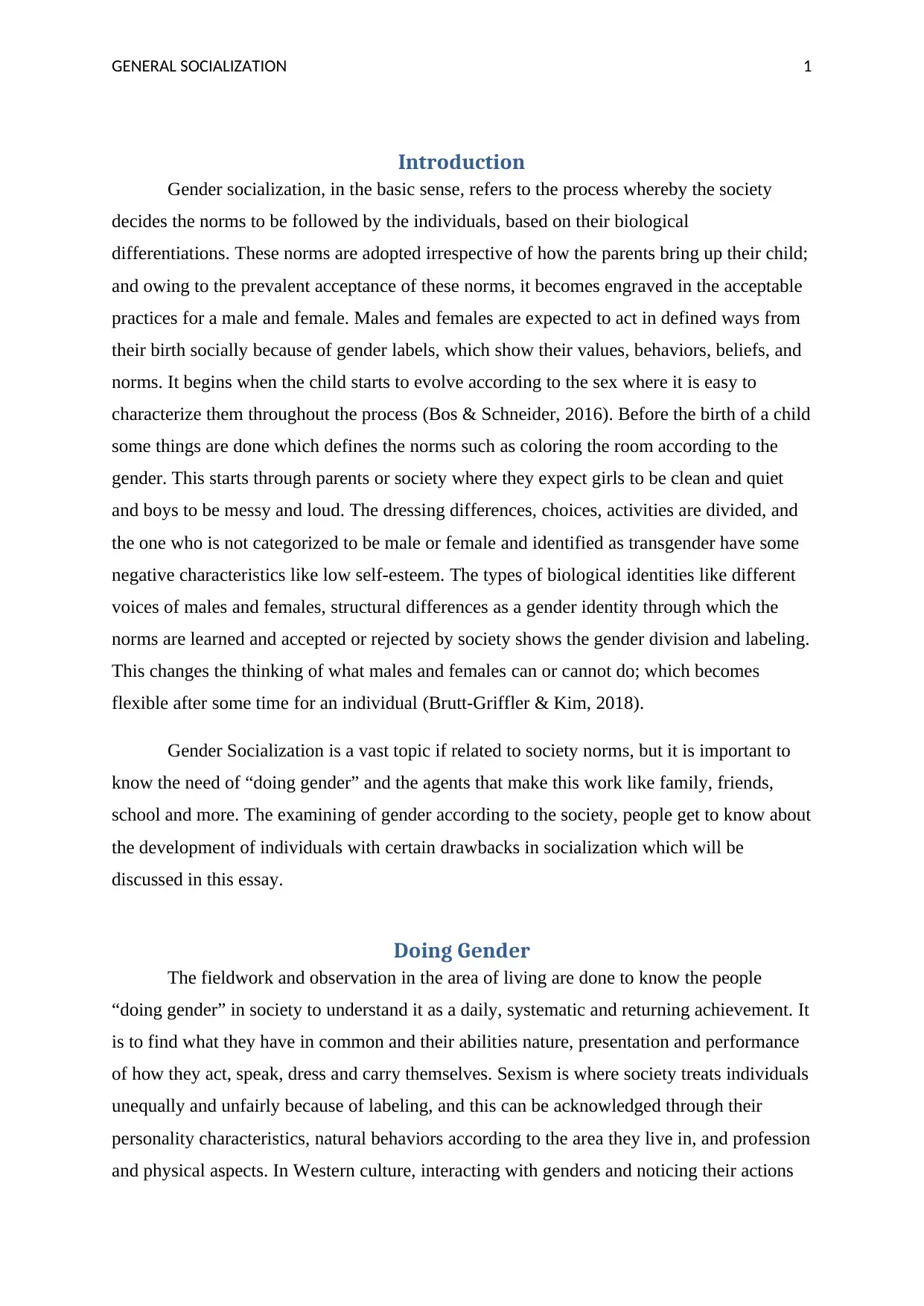
GENERAL SOCIALIZATION 1
Introduction
Gender socialization, in the basic sense, refers to the process whereby the society
decides the norms to be followed by the individuals, based on their biological
differentiations. These norms are adopted irrespective of how the parents bring up their child;
and owing to the prevalent acceptance of these norms, it becomes engraved in the acceptable
practices for a male and female. Males and females are expected to act in defined ways from
their birth socially because of gender labels, which show their values, behaviors, beliefs, and
norms. It begins when the child starts to evolve according to the sex where it is easy to
characterize them throughout the process (Bos & Schneider, 2016). Before the birth of a child
some things are done which defines the norms such as coloring the room according to the
gender. This starts through parents or society where they expect girls to be clean and quiet
and boys to be messy and loud. The dressing differences, choices, activities are divided, and
the one who is not categorized to be male or female and identified as transgender have some
negative characteristics like low self-esteem. The types of biological identities like different
voices of males and females, structural differences as a gender identity through which the
norms are learned and accepted or rejected by society shows the gender division and labeling.
This changes the thinking of what males and females can or cannot do; which becomes
flexible after some time for an individual (Brutt‐Griffler & Kim, 2018).
Gender Socialization is a vast topic if related to society norms, but it is important to
know the need of “doing gender” and the agents that make this work like family, friends,
school and more. The examining of gender according to the society, people get to know about
the development of individuals with certain drawbacks in socialization which will be
discussed in this essay.
Doing Gender
The fieldwork and observation in the area of living are done to know the people
“doing gender” in society to understand it as a daily, systematic and returning achievement. It
is to find what they have in common and their abilities nature, presentation and performance
of how they act, speak, dress and carry themselves. Sexism is where society treats individuals
unequally and unfairly because of labeling, and this can be acknowledged through their
personality characteristics, natural behaviors according to the area they live in, and profession
and physical aspects. In Western culture, interacting with genders and noticing their actions
Introduction
Gender socialization, in the basic sense, refers to the process whereby the society
decides the norms to be followed by the individuals, based on their biological
differentiations. These norms are adopted irrespective of how the parents bring up their child;
and owing to the prevalent acceptance of these norms, it becomes engraved in the acceptable
practices for a male and female. Males and females are expected to act in defined ways from
their birth socially because of gender labels, which show their values, behaviors, beliefs, and
norms. It begins when the child starts to evolve according to the sex where it is easy to
characterize them throughout the process (Bos & Schneider, 2016). Before the birth of a child
some things are done which defines the norms such as coloring the room according to the
gender. This starts through parents or society where they expect girls to be clean and quiet
and boys to be messy and loud. The dressing differences, choices, activities are divided, and
the one who is not categorized to be male or female and identified as transgender have some
negative characteristics like low self-esteem. The types of biological identities like different
voices of males and females, structural differences as a gender identity through which the
norms are learned and accepted or rejected by society shows the gender division and labeling.
This changes the thinking of what males and females can or cannot do; which becomes
flexible after some time for an individual (Brutt‐Griffler & Kim, 2018).
Gender Socialization is a vast topic if related to society norms, but it is important to
know the need of “doing gender” and the agents that make this work like family, friends,
school and more. The examining of gender according to the society, people get to know about
the development of individuals with certain drawbacks in socialization which will be
discussed in this essay.
Doing Gender
The fieldwork and observation in the area of living are done to know the people
“doing gender” in society to understand it as a daily, systematic and returning achievement. It
is to find what they have in common and their abilities nature, presentation and performance
of how they act, speak, dress and carry themselves. Sexism is where society treats individuals
unequally and unfairly because of labeling, and this can be acknowledged through their
personality characteristics, natural behaviors according to the area they live in, and profession
and physical aspects. In Western culture, interacting with genders and noticing their actions
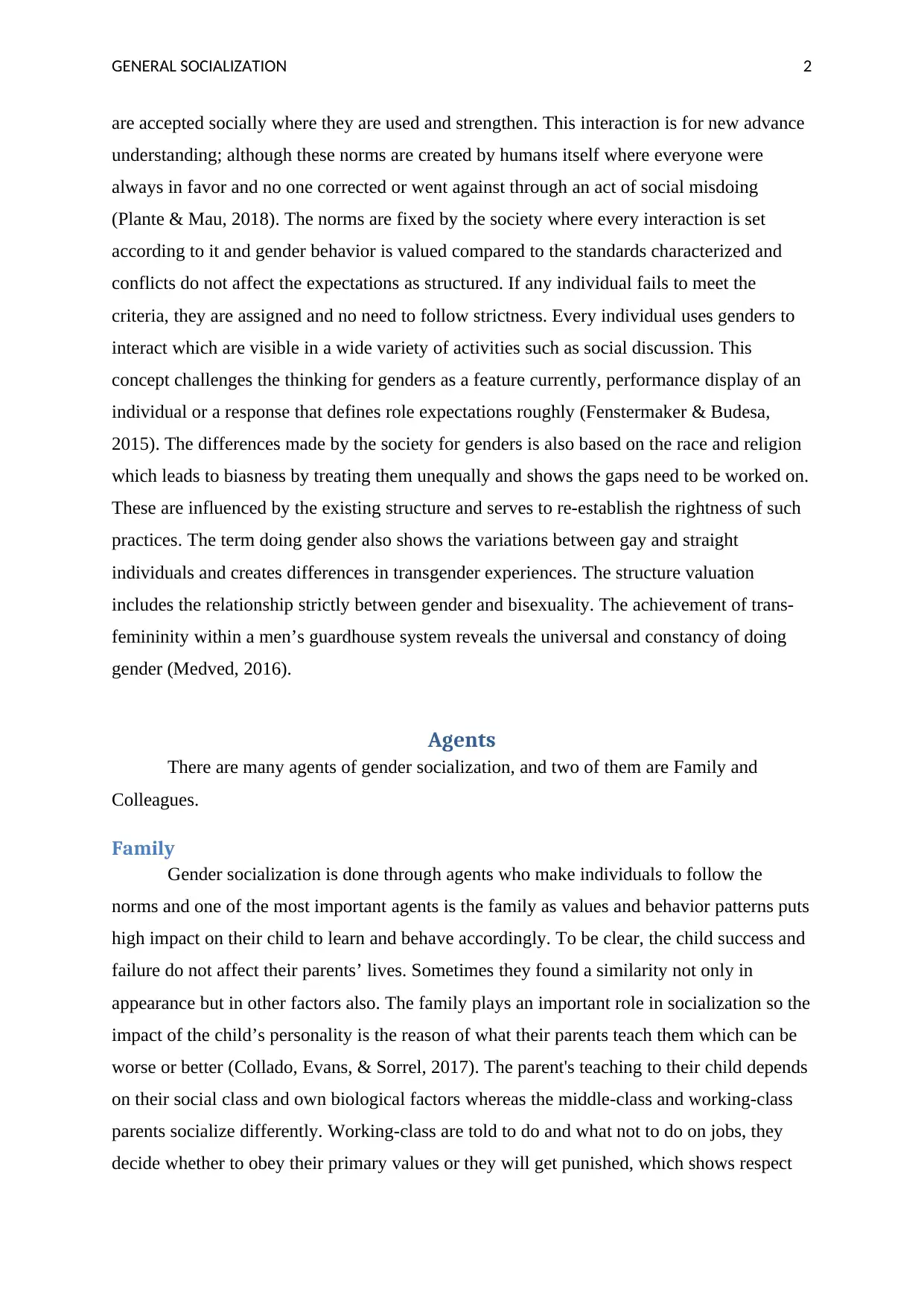
GENERAL SOCIALIZATION 2
are accepted socially where they are used and strengthen. This interaction is for new advance
understanding; although these norms are created by humans itself where everyone were
always in favor and no one corrected or went against through an act of social misdoing
(Plante & Mau, 2018). The norms are fixed by the society where every interaction is set
according to it and gender behavior is valued compared to the standards characterized and
conflicts do not affect the expectations as structured. If any individual fails to meet the
criteria, they are assigned and no need to follow strictness. Every individual uses genders to
interact which are visible in a wide variety of activities such as social discussion. This
concept challenges the thinking for genders as a feature currently, performance display of an
individual or a response that defines role expectations roughly (Fenstermaker & Budesa,
2015). The differences made by the society for genders is also based on the race and religion
which leads to biasness by treating them unequally and shows the gaps need to be worked on.
These are influenced by the existing structure and serves to re-establish the rightness of such
practices. The term doing gender also shows the variations between gay and straight
individuals and creates differences in transgender experiences. The structure valuation
includes the relationship strictly between gender and bisexuality. The achievement of trans-
femininity within a men’s guardhouse system reveals the universal and constancy of doing
gender (Medved, 2016).
Agents
There are many agents of gender socialization, and two of them are Family and
Colleagues.
Family
Gender socialization is done through agents who make individuals to follow the
norms and one of the most important agents is the family as values and behavior patterns puts
high impact on their child to learn and behave accordingly. To be clear, the child success and
failure do not affect their parents’ lives. Sometimes they found a similarity not only in
appearance but in other factors also. The family plays an important role in socialization so the
impact of the child’s personality is the reason of what their parents teach them which can be
worse or better (Collado, Evans, & Sorrel, 2017). The parent's teaching to their child depends
on their social class and own biological factors whereas the middle-class and working-class
parents socialize differently. Working-class are told to do and what not to do on jobs, they
decide whether to obey their primary values or they will get punished, which shows respect
are accepted socially where they are used and strengthen. This interaction is for new advance
understanding; although these norms are created by humans itself where everyone were
always in favor and no one corrected or went against through an act of social misdoing
(Plante & Mau, 2018). The norms are fixed by the society where every interaction is set
according to it and gender behavior is valued compared to the standards characterized and
conflicts do not affect the expectations as structured. If any individual fails to meet the
criteria, they are assigned and no need to follow strictness. Every individual uses genders to
interact which are visible in a wide variety of activities such as social discussion. This
concept challenges the thinking for genders as a feature currently, performance display of an
individual or a response that defines role expectations roughly (Fenstermaker & Budesa,
2015). The differences made by the society for genders is also based on the race and religion
which leads to biasness by treating them unequally and shows the gaps need to be worked on.
These are influenced by the existing structure and serves to re-establish the rightness of such
practices. The term doing gender also shows the variations between gay and straight
individuals and creates differences in transgender experiences. The structure valuation
includes the relationship strictly between gender and bisexuality. The achievement of trans-
femininity within a men’s guardhouse system reveals the universal and constancy of doing
gender (Medved, 2016).
Agents
There are many agents of gender socialization, and two of them are Family and
Colleagues.
Family
Gender socialization is done through agents who make individuals to follow the
norms and one of the most important agents is the family as values and behavior patterns puts
high impact on their child to learn and behave accordingly. To be clear, the child success and
failure do not affect their parents’ lives. Sometimes they found a similarity not only in
appearance but in other factors also. The family plays an important role in socialization so the
impact of the child’s personality is the reason of what their parents teach them which can be
worse or better (Collado, Evans, & Sorrel, 2017). The parent's teaching to their child depends
on their social class and own biological factors whereas the middle-class and working-class
parents socialize differently. Working-class are told to do and what not to do on jobs, they
decide whether to obey their primary values or they will get punished, which shows respect
⊘ This is a preview!⊘
Do you want full access?
Subscribe today to unlock all pages.

Trusted by 1+ million students worldwide
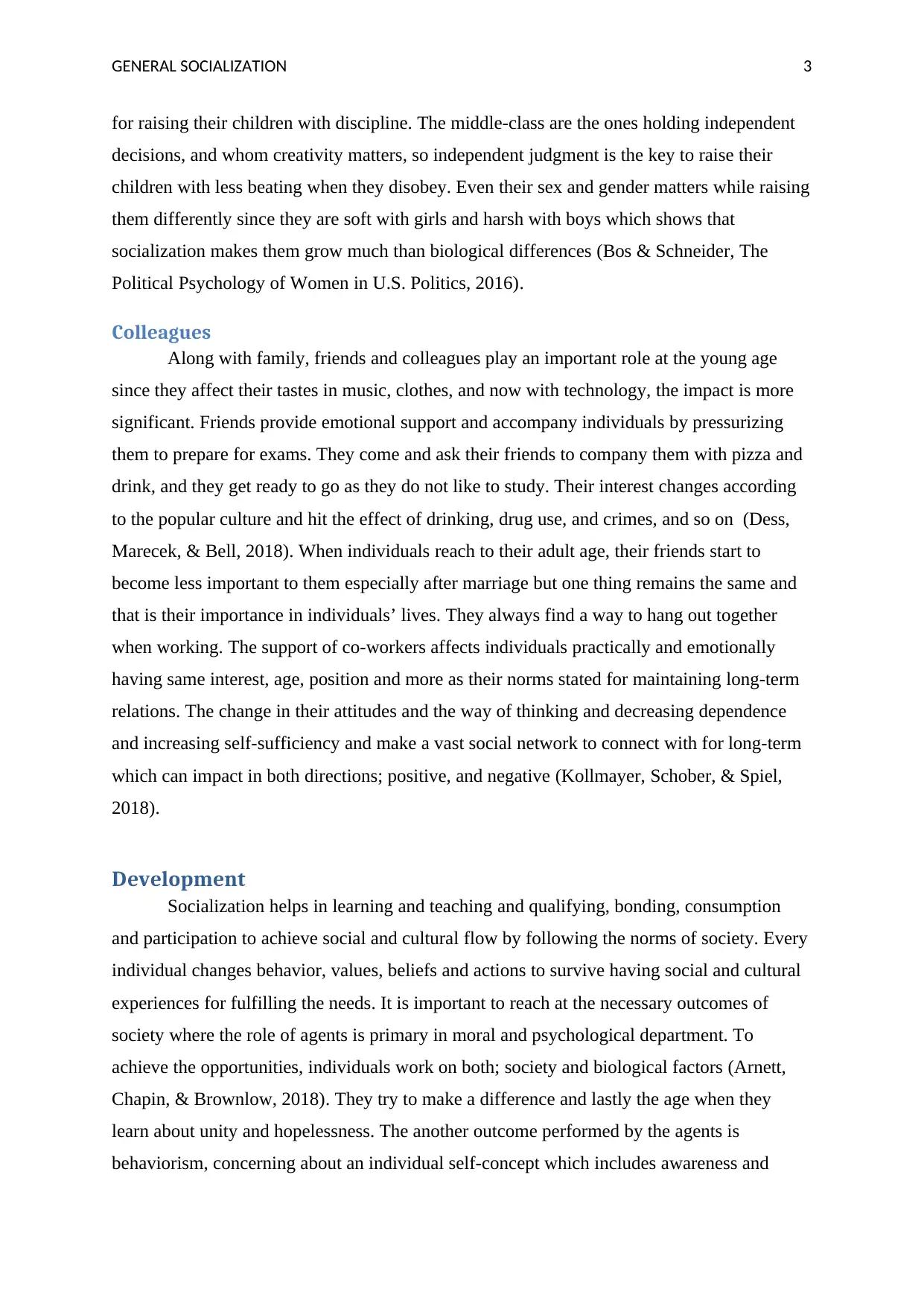
GENERAL SOCIALIZATION 3
for raising their children with discipline. The middle-class are the ones holding independent
decisions, and whom creativity matters, so independent judgment is the key to raise their
children with less beating when they disobey. Even their sex and gender matters while raising
them differently since they are soft with girls and harsh with boys which shows that
socialization makes them grow much than biological differences (Bos & Schneider, The
Political Psychology of Women in U.S. Politics, 2016).
Colleagues
Along with family, friends and colleagues play an important role at the young age
since they affect their tastes in music, clothes, and now with technology, the impact is more
significant. Friends provide emotional support and accompany individuals by pressurizing
them to prepare for exams. They come and ask their friends to company them with pizza and
drink, and they get ready to go as they do not like to study. Their interest changes according
to the popular culture and hit the effect of drinking, drug use, and crimes, and so on (Dess,
Marecek, & Bell, 2018). When individuals reach to their adult age, their friends start to
become less important to them especially after marriage but one thing remains the same and
that is their importance in individuals’ lives. They always find a way to hang out together
when working. The support of co-workers affects individuals practically and emotionally
having same interest, age, position and more as their norms stated for maintaining long-term
relations. The change in their attitudes and the way of thinking and decreasing dependence
and increasing self-sufficiency and make a vast social network to connect with for long-term
which can impact in both directions; positive, and negative (Kollmayer, Schober, & Spiel,
2018).
Development
Socialization helps in learning and teaching and qualifying, bonding, consumption
and participation to achieve social and cultural flow by following the norms of society. Every
individual changes behavior, values, beliefs and actions to survive having social and cultural
experiences for fulfilling the needs. It is important to reach at the necessary outcomes of
society where the role of agents is primary in moral and psychological department. To
achieve the opportunities, individuals work on both; society and biological factors (Arnett,
Chapin, & Brownlow, 2018). They try to make a difference and lastly the age when they
learn about unity and hopelessness. The another outcome performed by the agents is
behaviorism, concerning about an individual self-concept which includes awareness and
for raising their children with discipline. The middle-class are the ones holding independent
decisions, and whom creativity matters, so independent judgment is the key to raise their
children with less beating when they disobey. Even their sex and gender matters while raising
them differently since they are soft with girls and harsh with boys which shows that
socialization makes them grow much than biological differences (Bos & Schneider, The
Political Psychology of Women in U.S. Politics, 2016).
Colleagues
Along with family, friends and colleagues play an important role at the young age
since they affect their tastes in music, clothes, and now with technology, the impact is more
significant. Friends provide emotional support and accompany individuals by pressurizing
them to prepare for exams. They come and ask their friends to company them with pizza and
drink, and they get ready to go as they do not like to study. Their interest changes according
to the popular culture and hit the effect of drinking, drug use, and crimes, and so on (Dess,
Marecek, & Bell, 2018). When individuals reach to their adult age, their friends start to
become less important to them especially after marriage but one thing remains the same and
that is their importance in individuals’ lives. They always find a way to hang out together
when working. The support of co-workers affects individuals practically and emotionally
having same interest, age, position and more as their norms stated for maintaining long-term
relations. The change in their attitudes and the way of thinking and decreasing dependence
and increasing self-sufficiency and make a vast social network to connect with for long-term
which can impact in both directions; positive, and negative (Kollmayer, Schober, & Spiel,
2018).
Development
Socialization helps in learning and teaching and qualifying, bonding, consumption
and participation to achieve social and cultural flow by following the norms of society. Every
individual changes behavior, values, beliefs and actions to survive having social and cultural
experiences for fulfilling the needs. It is important to reach at the necessary outcomes of
society where the role of agents is primary in moral and psychological department. To
achieve the opportunities, individuals work on both; society and biological factors (Arnett,
Chapin, & Brownlow, 2018). They try to make a difference and lastly the age when they
learn about unity and hopelessness. The another outcome performed by the agents is
behaviorism, concerning about an individual self-concept which includes awareness and
Paraphrase This Document
Need a fresh take? Get an instant paraphrase of this document with our AI Paraphraser
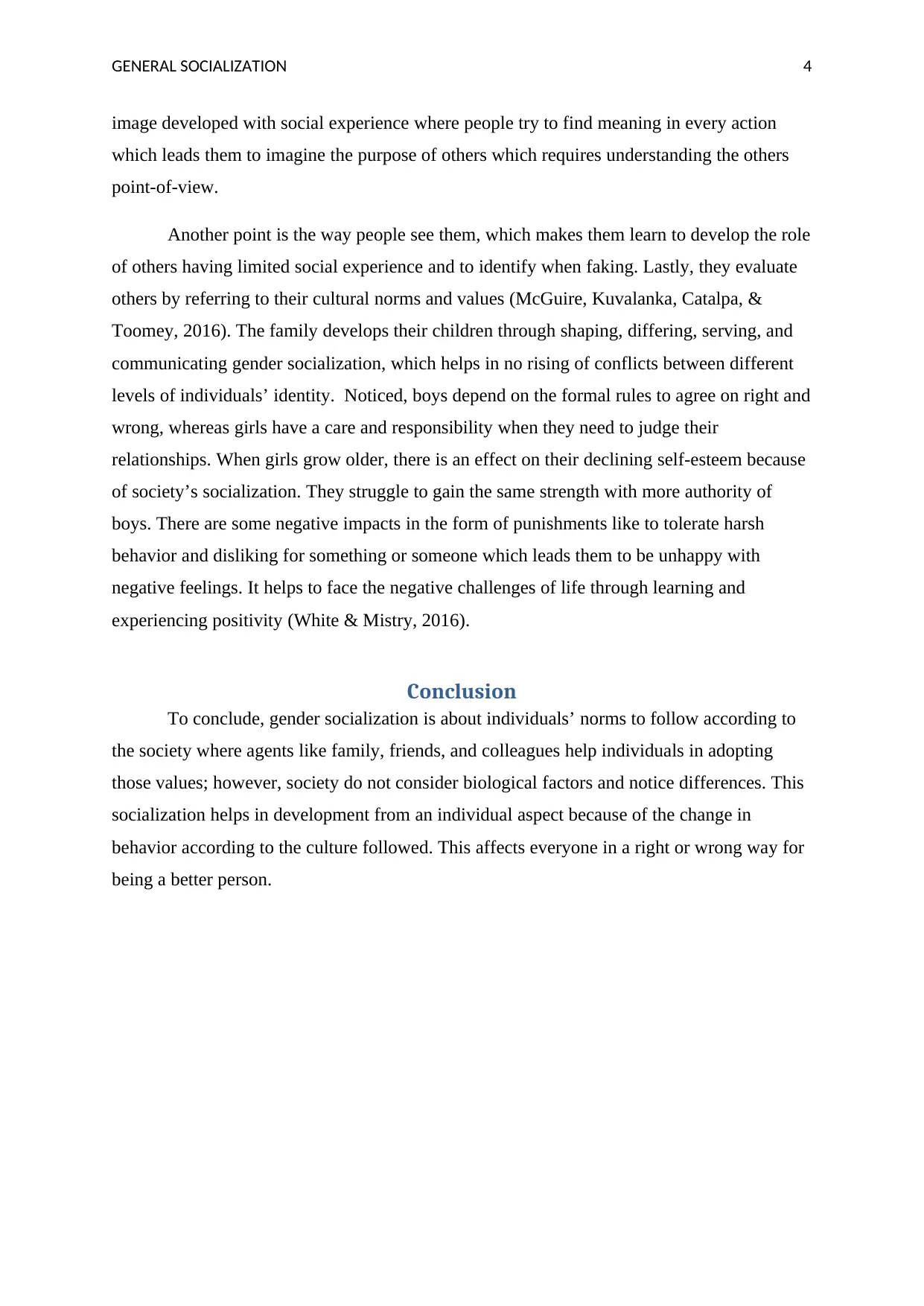
GENERAL SOCIALIZATION 4
image developed with social experience where people try to find meaning in every action
which leads them to imagine the purpose of others which requires understanding the others
point-of-view.
Another point is the way people see them, which makes them learn to develop the role
of others having limited social experience and to identify when faking. Lastly, they evaluate
others by referring to their cultural norms and values (McGuire, Kuvalanka, Catalpa, &
Toomey, 2016). The family develops their children through shaping, differing, serving, and
communicating gender socialization, which helps in no rising of conflicts between different
levels of individuals’ identity. Noticed, boys depend on the formal rules to agree on right and
wrong, whereas girls have a care and responsibility when they need to judge their
relationships. When girls grow older, there is an effect on their declining self-esteem because
of society’s socialization. They struggle to gain the same strength with more authority of
boys. There are some negative impacts in the form of punishments like to tolerate harsh
behavior and disliking for something or someone which leads them to be unhappy with
negative feelings. It helps to face the negative challenges of life through learning and
experiencing positivity (White & Mistry, 2016).
Conclusion
To conclude, gender socialization is about individuals’ norms to follow according to
the society where agents like family, friends, and colleagues help individuals in adopting
those values; however, society do not consider biological factors and notice differences. This
socialization helps in development from an individual aspect because of the change in
behavior according to the culture followed. This affects everyone in a right or wrong way for
being a better person.
image developed with social experience where people try to find meaning in every action
which leads them to imagine the purpose of others which requires understanding the others
point-of-view.
Another point is the way people see them, which makes them learn to develop the role
of others having limited social experience and to identify when faking. Lastly, they evaluate
others by referring to their cultural norms and values (McGuire, Kuvalanka, Catalpa, &
Toomey, 2016). The family develops their children through shaping, differing, serving, and
communicating gender socialization, which helps in no rising of conflicts between different
levels of individuals’ identity. Noticed, boys depend on the formal rules to agree on right and
wrong, whereas girls have a care and responsibility when they need to judge their
relationships. When girls grow older, there is an effect on their declining self-esteem because
of society’s socialization. They struggle to gain the same strength with more authority of
boys. There are some negative impacts in the form of punishments like to tolerate harsh
behavior and disliking for something or someone which leads them to be unhappy with
negative feelings. It helps to face the negative challenges of life through learning and
experiencing positivity (White & Mistry, 2016).
Conclusion
To conclude, gender socialization is about individuals’ norms to follow according to
the society where agents like family, friends, and colleagues help individuals in adopting
those values; however, society do not consider biological factors and notice differences. This
socialization helps in development from an individual aspect because of the change in
behavior according to the culture followed. This affects everyone in a right or wrong way for
being a better person.
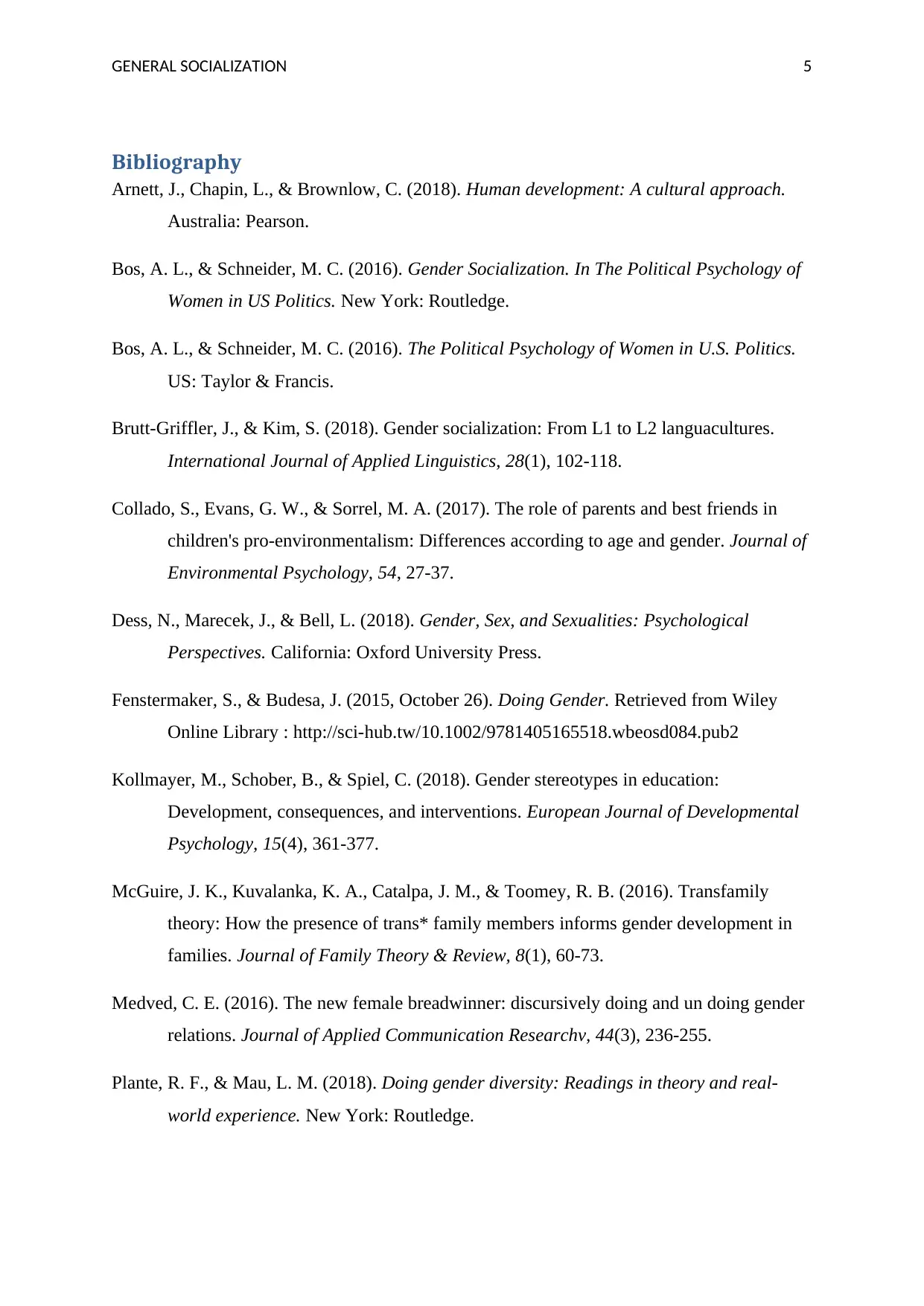
GENERAL SOCIALIZATION 5
Bibliography
Arnett, J., Chapin, L., & Brownlow, C. (2018). Human development: A cultural approach.
Australia: Pearson.
Bos, A. L., & Schneider, M. C. (2016). Gender Socialization. In The Political Psychology of
Women in US Politics. New York: Routledge.
Bos, A. L., & Schneider, M. C. (2016). The Political Psychology of Women in U.S. Politics.
US: Taylor & Francis.
Brutt‐Griffler, J., & Kim, S. (2018). Gender socialization: From L1 to L2 languacultures.
International Journal of Applied Linguistics, 28(1), 102-118.
Collado, S., Evans, G. W., & Sorrel, M. A. (2017). The role of parents and best friends in
children's pro-environmentalism: Differences according to age and gender. Journal of
Environmental Psychology, 54, 27-37.
Dess, N., Marecek, J., & Bell, L. (2018). Gender, Sex, and Sexualities: Psychological
Perspectives. California: Oxford University Press.
Fenstermaker, S., & Budesa, J. (2015, October 26). Doing Gender. Retrieved from Wiley
Online Library : http://sci-hub.tw/10.1002/9781405165518.wbeosd084.pub2
Kollmayer, M., Schober, B., & Spiel, C. (2018). Gender stereotypes in education:
Development, consequences, and interventions. European Journal of Developmental
Psychology, 15(4), 361-377.
McGuire, J. K., Kuvalanka, K. A., Catalpa, J. M., & Toomey, R. B. (2016). Transfamily
theory: How the presence of trans* family members informs gender development in
families. Journal of Family Theory & Review, 8(1), 60-73.
Medved, C. E. (2016). The new female breadwinner: discursively doing and un doing gender
relations. Journal of Applied Communication Researchv, 44(3), 236-255.
Plante, R. F., & Mau, L. M. (2018). Doing gender diversity: Readings in theory and real-
world experience. New York: Routledge.
Bibliography
Arnett, J., Chapin, L., & Brownlow, C. (2018). Human development: A cultural approach.
Australia: Pearson.
Bos, A. L., & Schneider, M. C. (2016). Gender Socialization. In The Political Psychology of
Women in US Politics. New York: Routledge.
Bos, A. L., & Schneider, M. C. (2016). The Political Psychology of Women in U.S. Politics.
US: Taylor & Francis.
Brutt‐Griffler, J., & Kim, S. (2018). Gender socialization: From L1 to L2 languacultures.
International Journal of Applied Linguistics, 28(1), 102-118.
Collado, S., Evans, G. W., & Sorrel, M. A. (2017). The role of parents and best friends in
children's pro-environmentalism: Differences according to age and gender. Journal of
Environmental Psychology, 54, 27-37.
Dess, N., Marecek, J., & Bell, L. (2018). Gender, Sex, and Sexualities: Psychological
Perspectives. California: Oxford University Press.
Fenstermaker, S., & Budesa, J. (2015, October 26). Doing Gender. Retrieved from Wiley
Online Library : http://sci-hub.tw/10.1002/9781405165518.wbeosd084.pub2
Kollmayer, M., Schober, B., & Spiel, C. (2018). Gender stereotypes in education:
Development, consequences, and interventions. European Journal of Developmental
Psychology, 15(4), 361-377.
McGuire, J. K., Kuvalanka, K. A., Catalpa, J. M., & Toomey, R. B. (2016). Transfamily
theory: How the presence of trans* family members informs gender development in
families. Journal of Family Theory & Review, 8(1), 60-73.
Medved, C. E. (2016). The new female breadwinner: discursively doing and un doing gender
relations. Journal of Applied Communication Researchv, 44(3), 236-255.
Plante, R. F., & Mau, L. M. (2018). Doing gender diversity: Readings in theory and real-
world experience. New York: Routledge.
⊘ This is a preview!⊘
Do you want full access?
Subscribe today to unlock all pages.

Trusted by 1+ million students worldwide

GENERAL SOCIALIZATION 6
White, E. S., & Mistry, R. S. (2016). Parent civic beliefs, civic participation, socialization
practices, and child civic engagement. Applied Developmental Science, 20(1), 44-60.
White, E. S., & Mistry, R. S. (2016). Parent civic beliefs, civic participation, socialization
practices, and child civic engagement. Applied Developmental Science, 20(1), 44-60.
1 out of 7
Related Documents
Your All-in-One AI-Powered Toolkit for Academic Success.
+13062052269
info@desklib.com
Available 24*7 on WhatsApp / Email
![[object Object]](/_next/static/media/star-bottom.7253800d.svg)
Unlock your academic potential
Copyright © 2020–2026 A2Z Services. All Rights Reserved. Developed and managed by ZUCOL.




